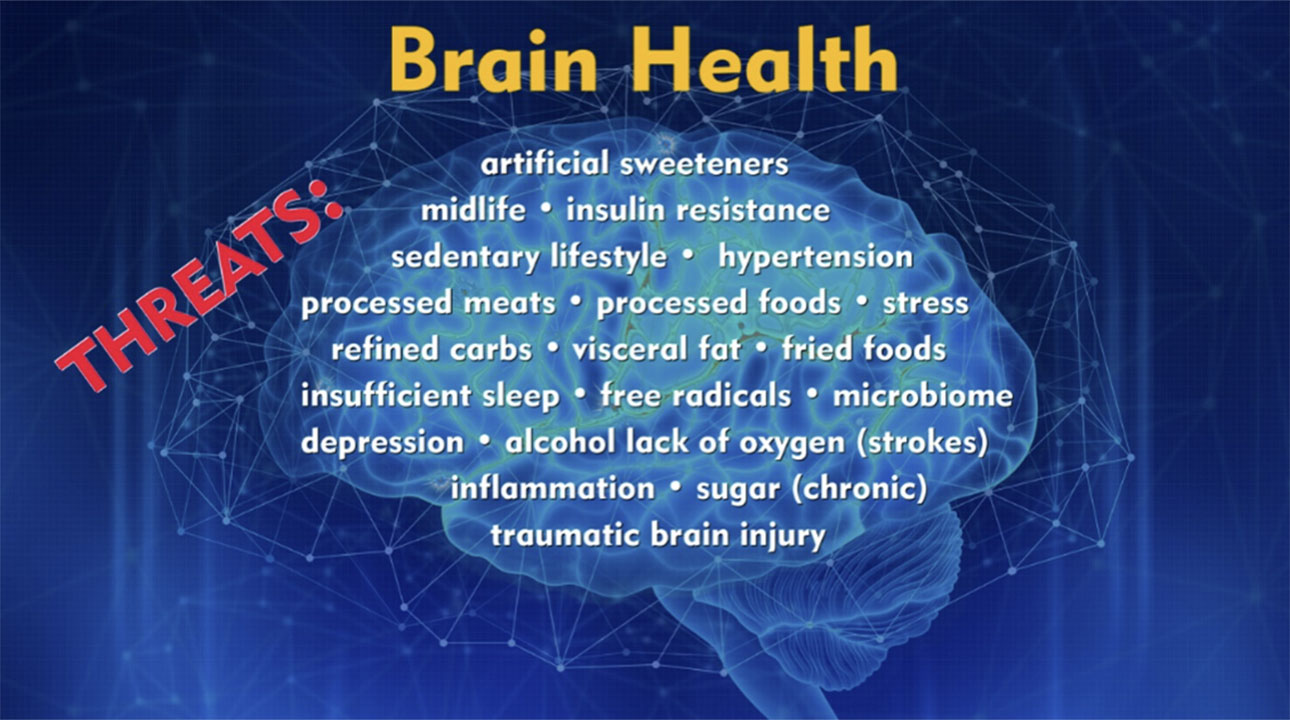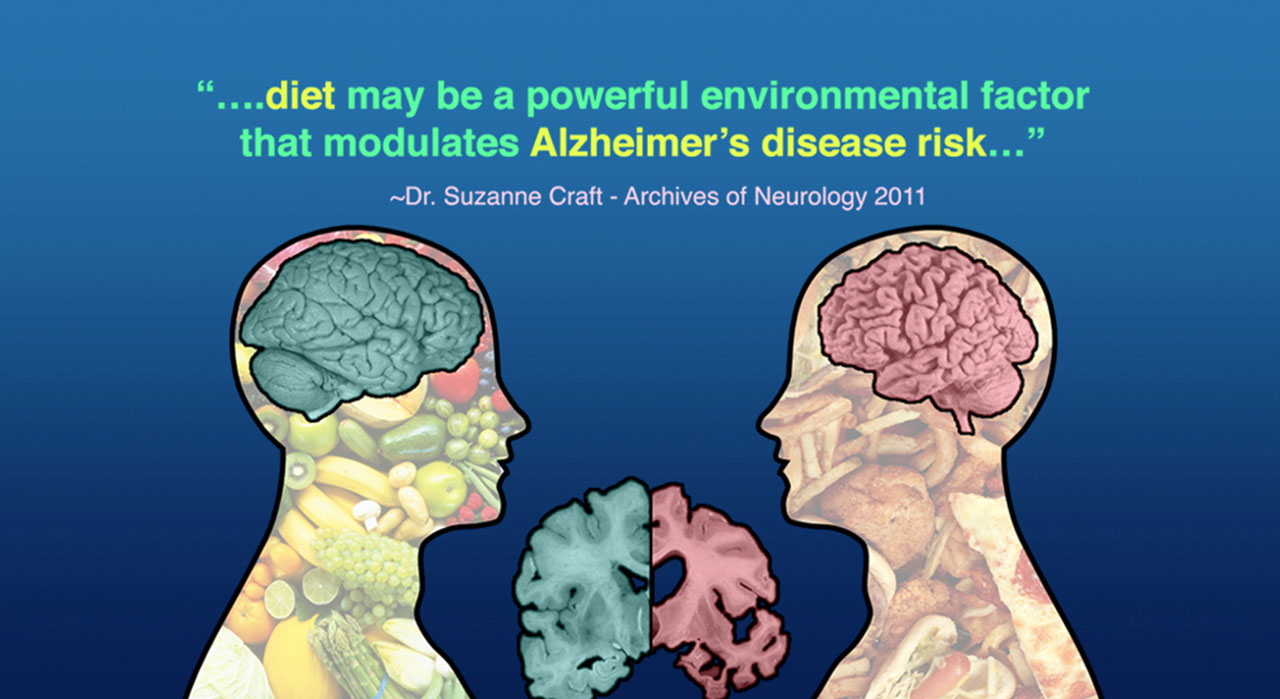Let’s Get Smart(er) – Holistic Brain Support
Who wants to get smarter? Students? Yes. Gamers? Yes. Businesspeople? Yes. Older folks? Yes. Pretty much everybody I would think. So what can we do about it? Can we impact our brain health in any significant way? The answer to this is a resounding “YES”.
Surveys found that maintaining our mental faculties is a leading health concern as we age – a well-founded concern when you look at facts around dementia.
- Currently there are over 55 million people worldwide living with dementia with this number expected to almost double every 20 years, reaching 78 million in 2030 and 139 million in 2050.
- The risk of developing dementia increases with age.
- Symptoms of dementia can vary depending on the type of dementia, but they often include memory loss, difficulty thinking and problem-solving, changes in personality and behavior, and difficulty with language.
- The medical costs of dementia are enormous. In 2019, the global cost of dementia was estimated to be $1.3 trillion, and we can expect this cost to dramatically increase as the number of people with dementia increases.
Our brains are also constantly confronted with a number of challenges from unhealthy lifestyle choices to poor diets.
What Can We Do?
To start with, there are a number of lifestyle behaviors that can help prevent dementia. Some of the most impactful ones include:
- Eat a healthy diet that includes eating plenty of fruits, vegetables, whole grains, and lean protein. It is also important to limit ultra-processed foods, sugary drinks, and saturated and unhealthy fats. Of special note is the need to avoid foods that spike blood sugar and insulin level (more on this later).
- Maintain a healthy weight. Being overweight or obese is a risk factor for dementia, so it is important to maintain a healthy weight throughout your life.
- Get regular exercise: Exercise is good for the brain as well as the body. Aim for at least 30 minutes of moderate-intensity exercise most days of the week.
- Manage stress: Stress can take a toll on the brain, so it is important to find healthy ways to manage stress. This could include relaxation techniques such as yoga or meditation, or spending time in nature. Three of my favorite “stress” remedies are Reishi, Ashwagandha, and Relora®.*
- Stay socially active: Social interaction is important for brain health. Make an effort to stay connected with friends and family, and participate in activities that you enjoy.
- Quit smoking: Smoking is a major risk factor for dementia.
- Limit alcohol intake: Excessive alcohol intake can damage the brain, so it is important to limit alcohol intake to moderate levels.
- Get enough sleep: Sleep is crucial for brain health. During sleep, the brain undergoes important restorative processes that are essential for cognitive function, emotional well-being, and overall brain health. During sleep the brain does memory consolidation, synaptic pruning, detoxification, and repair and growth just to name a few things. Most adults need around 7-8 hours of sleep per night, but find out what works optimally for you.
 Challenge your mind: Keeping your mind active can help to prevent dementia. This could include activities such as learning a new language, playing a musical instrument, or doing crossword puzzles. Key here is to pick new challenges, doing the same thing over time becomes less effective.
Challenge your mind: Keeping your mind active can help to prevent dementia. This could include activities such as learning a new language, playing a musical instrument, or doing crossword puzzles. Key here is to pick new challenges, doing the same thing over time becomes less effective.
Move
Possibly one of the most significant things you can do to support your brain, one that makes the case for a holistic approach, is to get regular exercise. I imagine we’ve all heard the lectures on how important exercise is for our health so I’ll spare you the lecture and just list some of the benefits of why it is a key for brain health. Exercise benefits the brain in many ways, including:
- Improved memory and cognitive function. Exercise can help improve memory, learning, and other cognitive skills. This is because exercise increases blood flow to the brain, which helps to deliver oxygen and nutrients to brain cells. Exercise also helps to promote the growth of new brain cells and the formation of new neural connections.
- Reduced risk of cognitive decline. Exercise can help to reduce the risk of cognitive decline, such as dementia. This is because exercise helps to protect the brain from damage and inflammation.
- Improved mood and mental health. Exercise can help to improve mood and reduce anxiety and depression. This is because exercise releases endorphins, which have mood-boosting effects.
- Increased attention and focus. Exercise can help to improve attention and focus. This is because exercise helps to increase the brain’s ability to filter out distractions and stay on task.
- Enhanced creativity. Exercise can help to enhance creativity. This is because exercise helps to improve the brain’s ability to generate new ideas and solve problems.
- Neurotransmitter production: Physical activity triggers the release of various neurotransmitters, such as dopamine, serotonin, and norepinephrine. These chemicals play a crucial role in regulating mood, reducing stress, and promoting overall well-being.
- Neuroplasticity: Exercise has been found to enhance neuroplasticity, which is the brain’s ability to adapt and reorganize itself. This is particularly important for learning, memory, and recovering from brain injuries.
- Brain-derived neurotrophic factor (BDNF) release: Exercise stimulates the production of BDNF, a protein that supports the growth and maintenance of brain cells. BDNF is associated with improved cognitive function and may help protect against neurodegenerative diseases.
 The amount of exercise that is needed to benefit brain health is a minimum of 30 minutes of moderate-intensity aerobic exercise most days of the week. However, even shorter bouts of exercise can be beneficial. For example, a study found that even 10 minutes of brisk walking can improve cognitive function.
The amount of exercise that is needed to benefit brain health is a minimum of 30 minutes of moderate-intensity aerobic exercise most days of the week. However, even shorter bouts of exercise can be beneficial. For example, a study found that even 10 minutes of brisk walking can improve cognitive function.
Bonus Tips
What it comes down to is the more you do for your brain, the better, so here are a few additional lifestyle tips that may be helpful for preventing dementia and optimizing brain function:
- Get regular hearing and vision tests: Hearing and vision loss can contribute to cognitive decline, so it is important to get regular checkups to ensure that your hearing and vision are healthy.
- Stay hydrated: Dehydration can impair cognitive function, so it is important to drink plenty of water throughout the day.
Avoid head injuries: Head injuries can increase the risk of dementia, so it is important to take steps to avoid them. This could include wearing a helmet when playing sports or riding a bike. - Manage chronic health conditions: If you have any chronic health conditions, such as high blood pressure, heart disease, or metabolic syndrome / pre-diabetes / diabetes.
Type 3
Yes, there might be a 3rd type of diabetes. Type 3 diabetes is a term that is sometimes used to describe the theory that insulin resistance and insulin-like growth factor dysfunction in the brain may cause Alzheimer’s disease. The term “type 3 diabetes” was first proposed in 2008 by Dr. Suzanne de la Monte and Dr. Jack Wands. They argued that Alzheimer’s disease is a form of diabetes that affects the brain. They pointed out that the brains of people with Alzheimer’s disease have high levels of insulin resistance and insulin-like growth factor dysfunction. They also noted that these same changes are seen in people with type 2 diabetes.
Insulin is a hormone that helps the body use glucose for energy. Insulin resistance is a condition where cells in the body become less sensitive to the effects of insulin. When cells become resistant to insulin, they do not take in as much glucose, which can lead to high blood sugar levels and the need for ever increasing amounts of insulin. Insulin resistance and high blood sugar levels can affect the brain in a number of ways. First, it can lead to inflammation in the brain that can damage cells and tissues, and it is thought to play a casual role in the development of Alzheimer’s disease. Second, insulin resistance can impair the brain’s ability to use glucose for energy which can lead to cognitive decline. Third, insulin resistance can increase the production of amyloid beta proteins. These proteins are thought to be a major factor in the development of Alzheimer’s disease.
A study published in the journal Alzheimer’s & Dementia found that people with type 2 diabetes were twice as likely to develop Alzheimer’s as people without diabetes. The study also found that people with prediabetes were 1.5 times as likely to develop Alzheimer’s as people without prediabetes.
Another study, published in the journal JAMA Neurology, found that people with high blood sugar levels were more likely to develop Alzheimer’s even if they did not have diabetes. The study found that for every 1% increase in blood sugar levels, the risk of Alzheimer’s increased by 17%.
These studies are strong evidence that keeping blood sugar levels under control may help reduce the risk of Alzheimer’s. My three favorite allies for managing healthy blood sugar and insulin levels are Maitake SX-fraction®, PGX fiber®, and chromium polynicotinate.*
Don’t Forget the Food
There is no one-size-fits-all answer to this question, as the best nutritional tips for preventing dementia or Alzheimer’s will vary depending on individual factors such as age, health status, and genetics. It all starts with eating a healthy, plant-based, colorful diet. It is also important to limit ultra-processed foods, sugary drinks, and saturated and unhealthy fats.
Here are some specific foods that may be beneficial for brain health:
- Berries: Berries are a good source of antioxidants, which can help protect the brain from damage and reduce inflammation.
- Green leafy vegetables: Green leafy vegetables are nutritionally dense foods, high in fiber and a good source of folate, which is important for brain health.
- Omega-3 fatty acids: Omega-3 fatty acids are found in fatty fish (e.g., salmon, mackerel, sardines) and plant-based sources (e.g., flaxseeds, chia seeds, walnuts), are crucial for brain health and have been associated with improved cognitive function.
- Incorporate healthy fats: Nuts and seeds are a good source of healthy fats, vitamins, and minerals that are important for brain health. Some good choices include almonds, walnuts, peanuts, and chia seeds. Also include other healthy fats like olive oil and avocados which are beneficial for brain health. They support cell membranes and help maintain healthy brain function.
- Olive oil: Olive oil is a good source of healthy fats that are important for brain health. Unfortunately olive oil is often adulterated so be sure to do your research and find legit ones. You can now buy “turbo charged” olive oils that have higher polyphenol levels.
Mushrooms – Brain Allies
Many mushrooms have been used for centuries by a number of cultures around the world. Today they are probably best known for their immune supporting benefits. But, thanks to decades of modern research we now can confirm a much wider array of health supporting benefits, including brain function. What makes them truly remarkable is the way they work holistically in the body with direct, targeted benefits along with indirect and peripheral holistic activities.* A number of mushrooms fit this bill so here is a brief look at a few, followed by a more detailed exploration of Maitake, Tremella, and of course, Lion’s mane.
 Reishi mushroom: This mushroom has been used in traditional Chinese medicine for centuries to improve cognitive function and reduce stress. Reishi mushroom contains compounds called triterpenes, which have been shown to have anti-inflammatory and antioxidant effects in the brain. They may also help to protect against neuronal damage caused by free radicals. When choosing a Reishi product make sure it utilizes fruiting body and is extracted in both hot water and alcohol, like Super Reishi (the triterpenes are extracted primarily in alcohol).*
Reishi mushroom: This mushroom has been used in traditional Chinese medicine for centuries to improve cognitive function and reduce stress. Reishi mushroom contains compounds called triterpenes, which have been shown to have anti-inflammatory and antioxidant effects in the brain. They may also help to protect against neuronal damage caused by free radicals. When choosing a Reishi product make sure it utilizes fruiting body and is extracted in both hot water and alcohol, like Super Reishi (the triterpenes are extracted primarily in alcohol).*
Shiitake mushroom: This mushroom is a good source of antioxidants, which can help to protect the brain from damage. Shiitake mushroom also contains compounds called lentinan and shiitake polysaccharide, which have been shown to have immune-boosting effects. These compounds may help to protect the brain by supporting a healthy nflammatory response.*
Chaga mushroom: This mushroom is a good source of beta-glucans, which have been shown to support a healthy inflammatory response along with antioxidant effects in the brain. Chaga mushroom may also help to improve blood flow to the brain, which can help to improve cognitive function.*
Cordyceps mushroom: Cordyceps has a long history of use and was highly-prized for its tonic, overall health supporting benefit. Cordyceps can help fight free radicals support healthy inflammation, improve blood flow to the brain, reduce stress, protect the brain, and enhance memory and learning.*
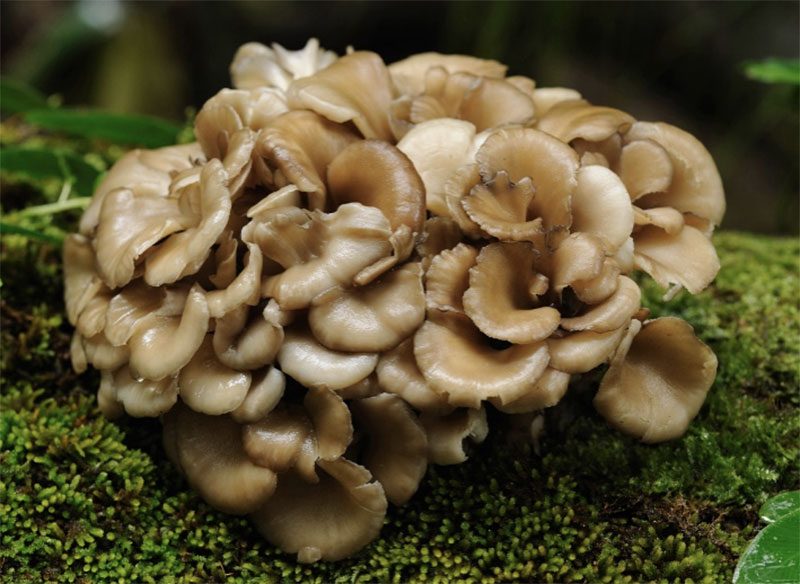 Maitake mushrooms, while most commonly thought of as an “immune aid”, it has recently been found to have a number of potential benefits for brain health, including:*
Maitake mushrooms, while most commonly thought of as an “immune aid”, it has recently been found to have a number of potential benefits for brain health, including:*
- Antioxidant protection: Maitake mushrooms are a good source of antioxidants, which can help protect the brain from damage caused by free radicals. Free radicals are unstable molecules that can damage cells and DNA.*
- Neurogenesis: Maitake mushrooms have been shown to promote neurogenesis, which is the growth of new brain cells. This is important for maintaining cognitive function and preventing age-related cognitive decline.*
- Immune modulation: Maitake mushrooms have immune-modulating properties, which can help to support the brain’s natural inflammatory response.*
- Blood sugar regulation: Maitake mushrooms can help to regulate healthy blood sugar levels, which is important for brain health. High blood sugar levels can damage blood vessels in the brain, which can lead to cognitive decline.*
Here are some of the studies that support the brain health benefits of Maitake mushrooms. A study in mice found that Maitake mushrooms helped to protect against cognitive decline and improve memory. Another study in mice found that Maitake mushrooms promoted neurogenesis and helped to repair damage to the brain caused by Alzheimer’s disease. And a human study found that people who ate Maitake mushrooms had lower levels of inflammation in the brain.*
 Tremella mushrooms have a number of potential benefits for brain health, including antioxidant protection, neurogenesis, which is the growth of new brain cells, immune modulation, healthy blood sugar regulation, and as a Yin tonic – hydration.*
Tremella mushrooms have a number of potential benefits for brain health, including antioxidant protection, neurogenesis, which is the growth of new brain cells, immune modulation, healthy blood sugar regulation, and as a Yin tonic – hydration.*
Overall, the research suggests that Tremella mushrooms have a number of potential benefits for brain health. Several studies have supported Tremella’s ability to support brain function. A study in mice found that Tremella mushrooms helped to protect against cognitive decline and improve memory. Another study in mice found that Tremella mushrooms promoted neurogenesis and helped to repair damage to the brain caused by Alzheimer’s disease. And lastly, a human study found that people who ate Tremella mushrooms had lower levels of inflammation in the brain.*
Lion’s Mane, the “Brain Mushroom”
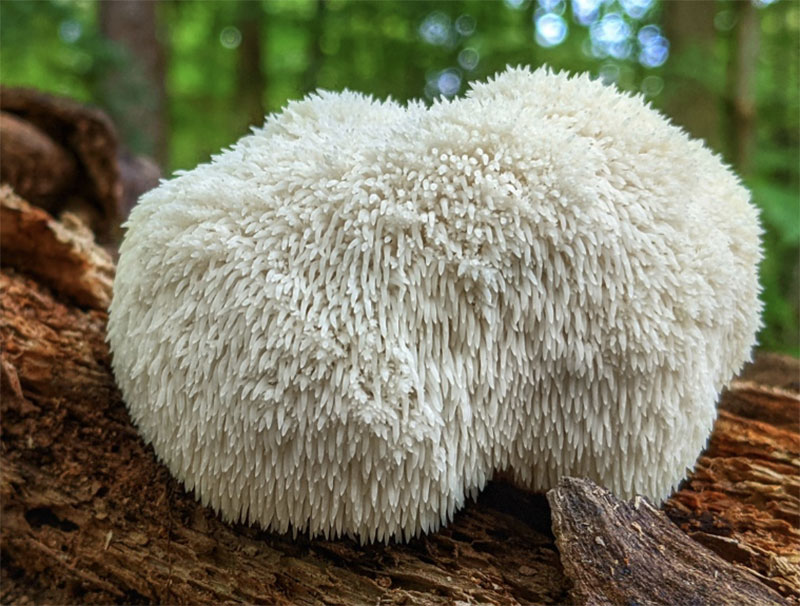 Lion’s mane is not your typical looking mushroom, with a coral-like appearance of shaggy white tendrils. This yummy edible mushroom can be found growing on dead and living broadleaf trees in North America, Europe, and Asia. Its Latin name, Hericium erinaceus, comes from Hericium meaning “hedgehog” and erinaceus named after the European hedgehog, so for all intents and purposes, it means “hedgehog hedgehog”.
Lion’s mane is not your typical looking mushroom, with a coral-like appearance of shaggy white tendrils. This yummy edible mushroom can be found growing on dead and living broadleaf trees in North America, Europe, and Asia. Its Latin name, Hericium erinaceus, comes from Hericium meaning “hedgehog” and erinaceus named after the European hedgehog, so for all intents and purposes, it means “hedgehog hedgehog”.
 Lion’s mane is also referred to as Hou tou gu in Chinese medicine and in Japan as Yamabushitake, named after the pom poms, that the Yamabushi warrior monks wore on their robes.
Lion’s mane is also referred to as Hou tou gu in Chinese medicine and in Japan as Yamabushitake, named after the pom poms, that the Yamabushi warrior monks wore on their robes.
In TCM Hou tou gu (Lion’s mane) is classified as a tonic herb, which means that it is used to nourish the body and promote overall health. It has been used in traditional Chinese medicine (TCM) for centuries and is said to have a number of specific health benefits, including:
- Toning the spleen and stomach: Hou tou gu is said to help improve digestion and absorption of nutrients. It is also thought to help reduce inflammation in the gut.*
- To treat digestive problems: Hou tou gu was used to treat a variety of digestive problems, including loss of appetite, diarrhea, and constipation.*
- Boosting the immune system: It is a good source of antioxidants, which can help protect the body from damage caused by free radicals. It is also thought to help stimulate the production of white blood cells, which play a role in the immune system.*
- Qi tonic: It is thought to boost the body’s vital energy and build vigor.*
- Supporting the 5 internal organs: the 5 internal organs in traditional Chinese medicine are the liver, heart, spleen, lung, and kidney which are said to manufacture and store Qi and blood.*
Lion’s mane mushroom: This mushroom is known for its ability to promote nerve growth factor (NGF) and brain derived neurotrophic factor (BDNF) and protect against neurodegenerative diseases. NGF induces neuronal differentiation, promotes survival of neurons, and promotes regeneration of nerves while decreasing neuro-degeneration. BDNF acts like “Miracle Grow” for the brain. It contains compounds called hericenones and erinacines, which have been shown to stimulate the growth of new neurons in the hippocampus, a region of the brain important for memory and learning. Lion’s mane mushroom may also help support a healthy inflammatory response as well as reduce oxidative stress in the brain, which can contribute to cognitive decline.*
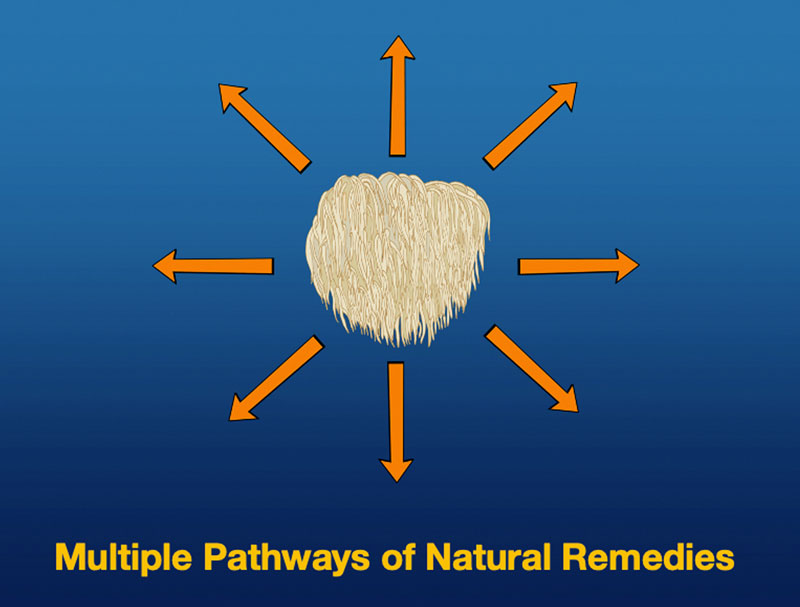 I consider it a “holistic” brain ally because of the numerous pathways and mechanisms it works on as well as its range of activities:
I consider it a “holistic” brain ally because of the numerous pathways and mechanisms it works on as well as its range of activities:
- Antioxidant protection: Lion’s mane mushrooms are a good source of antioxidants, which can help protect the brain from damage caused by free radicals. Free radicals are unstable molecules that can damage cells and DNA, and they have been linked to a number of chronic diseases, including Alzheimer’s disease.*
- Neurogenesis: Lion’s mane mushrooms have been shown to promote neurogenesis, which is the growth of new brain cells. This is important for maintaining cognitive function and preventing age-related cognitive decline.
- Healthy inflammatory support: Lion’s mane mushrooms supports a health inflammatory response which can help to protect the brain.*
- Improved cognitive function: Lion’s mane mushrooms have been shown to improve cognitive function in a number of studies. For example, one study found that Lion’s mane mushrooms improved memory and attention in people with mild cognitive impairment. Studies confirm it may improve memory, enhance neurotransmitter acetylcholine levels, and stimulate cognitive function.*
- Reduced anxiety and depression: Lion’s mane mushrooms have also been shown to reduce anxiety and depression. For example, one study found that Lion’s mane mushrooms improved mood and reduced anxiety in people with depression.*
While the initial research, including double-blind placebo-controlled research, is very promising, the evidence suggests that we may only be at the tip of the iceberg of brain and nerve benefits for Lion’s mane. Other holistic supportive actions include immune, healthy blood sugar, and cardiovascular support. One area of special mention, based upon some of the most recent research is its ability to support a healthy microbiome and acting as a prebiotic (food for the probiotics). A study using mice found that Lion’s mane increased the number of “good” bacteria while decreasing the number of “bad” bacteria. And thanks to a significant body of research we now know how fundamentally important the health of our microbiome is to overall health and vitality, including brain health and function.*
Here are some ways to incorporate Lion’s mane mushrooms into your diet: 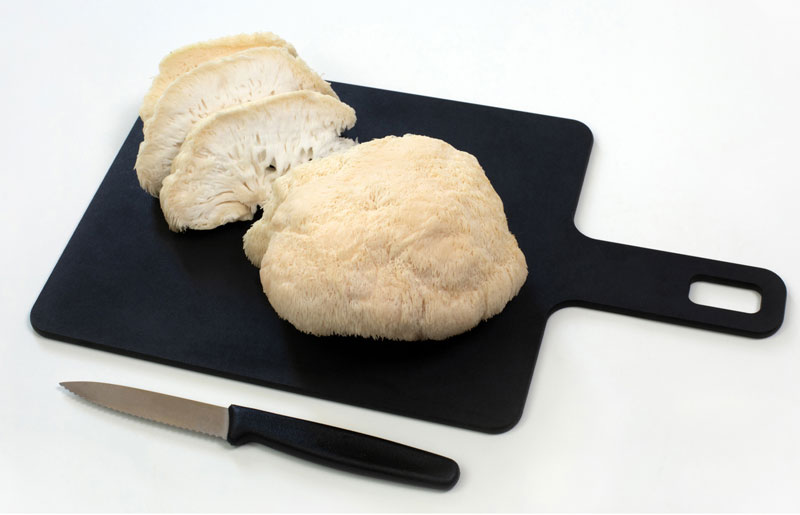
- Add them to soups, stews, and stir-fries. You can often find it in Asian supermarkets, but usually in the dried form. Fresh can be found in late summer and the fall.
- Make a tea with Lion’s mane mushrooms.
- Add them to smoothies.
- Purchase Lion’s mane mushroom powder or capsules and take them as a dietary supplement, like Super Lion’s mane.
- For a super charged, unique Lion’s mane supplement try the research-based product Lion’s mane Amyloban®. It’s the fastest acting brain supplement I have ever seen or experienced.*
It is important to note that Lion’s mane mushrooms are not a cure for any brain disease, however, they may be a helpful natural supplement for people who are looking to support and improve their brain health and function.* Here are some of the studies that support the brain health benefits of Lion’s mane mushrooms:
- A study in mice found that Lion’s mane mushrooms promoted neurogenesis.*
- Another study in mice found that Lion’s mane mushrooms improved cognitive function in mice with age-related cognitive decline.*
- A human study found that people who took Lion’s mane mushroom extract for 12 weeks had improved cognitive function.*
Holistic is the Way to Go
The brain is a very complex and integrated organ, connected to all parts of the body and responsible for overseeing thought, memory, breathing, hunger, motor skill, and every process that regulates the body. This being the case it becomes clearer and clear for the need to take a holistic, whole body approach to brain health and function, including lifestyle, diet, exercise, and tonic remedies, like functional mushrooms, to support and maximize our brain’s activities, health, and longevity.*
